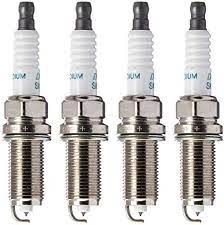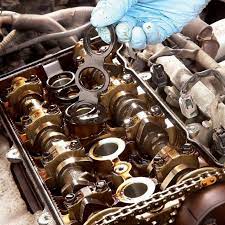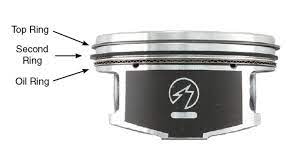Why Am I Finding Oil on my Spark Plugs?
This is not how your spark plugs should look so you have a problem. The dirt may be soot from improper combustion and the oil should not really be there. In this article we are going to explain more about spark plugs and what can cause them to become oily.
What Are Spark Plugs?
It’s understood that the three things that you need to cause combustion are fuel, oxygen and a spark. This is true of the internal combustion engine that powers our cars and other motor vehicles. Inside of our engines we will find small parts known as spark plugs.

These little devices deliver an electric current from an ignition system to the combustion chamber of a spark-ignition engine. This current is essentially the spark that ignites the compressed fuel and air mixture. And a big component of the air mixture of course is oxygen.
So essentially the spark plugs play a very essential part in turning on our engines. We have to ignite the fuel and air mixture to start the process of burning fuel to power our vehicle.
Can a Spark Plug Cause a Car Not to Start?
Well let's go back to our three things needed for combustion: fuel, oxygen and a spark. You need all three for ignition, if any one is absent then nothing happens. So if a spark plug is absent or unable to create a spark then the ignition will not occur.
If we can not start the burning of the fuel then the car will not start and it certainly will not run. So if the spark plug is not sparking then the fuel and air do not burn which means the pistons do not move and the engine will not run.
It should be noted that each burning of fuel to move a piston requires a spark so even if the car starts but the plug suddenly stops working the car will quickly start to lose power and potentially stop. There are usually multiple spark plugs however so you may be able to drive for a little while .
How to Recognize a Bad Spark Plug
It is not difficult to pull out a spark plug and take a look at it to assess if it might be faulty or broken. Signs of a faulty or dirty spark plug include:
- Evidence of oil coating the plug
- Fuel covering the plug
- Signs of burning such as carbon
- Blistering caused by the plug running too hot
It should be noted that fuel on the spark plug is what occurs when you “flood the engine.” Essentially trying to turn over the engine too many times without success creates a fuel rich environment with not enough oxygen to ignite the fuel.
The reason you wait for a while before trying to start the car again is that the fuel needs to evaporate and more oxygen needs to enter the combustion chamber. If it still does not work you may need to swap out the spark plugs for new ones.
What Causes Oil to Get on the Spark Plugs?
There can be a number of issues that may allow oil to enter the cylinders and as a result coat the spark plugs with oil. In this section we will look more closely at some of these problems that may arise and explain why they can be an issue.
Leaking Valve Cover Gasket
In the best case scenario if you are seeing oil on the threads of your spark plugs the good news is that the oil is not coming from inside the engine. This can mean an easier fix and hopefully a less expensive one. A leaking valve cover gasket can fill up the wells causing oil to get onto the threads of the plugs but not the ignition coils straight away.
Around the spark plug holes there are O-rings which may be either external or integrated into the valve cover gasket. If these become bad due to heat they can start to leak and oil will start to enter the spark plug holes.

This of course is not good for the ignition coils as the oil will reach them eventually and this can lead to engine misfires. If the whole plug is coated in oil then the gasket has been leaking for a while and should be repaired quickly and the plugs cleaned or replaced.
Clogged Crankcase Ventilation
If you find oil on the tip of your spark plugs this may be caused by oil in the combustion chamber or cylinder. This is not a good thing as it means it is likely an internal engine issue such as a clogged crankcase ventilation.
Over pressure caused by this issue forces oil into the combustion chambers where it can foul the fuel/air mix causing misfires. The oil will burn creating smoke and a bad smell as well as oil on the spark plugs.
You will want to check the crankcase ventilation to make sure it is not clogged and the one-way breathing valves are in working order.
Turbo Charger Issue
If your vehicle has a turbocharger you might find that the turbos inlet compressor seals are leaking. This can easily allow oil into the combustion chambers where it will also quickly end up coating the spark plugs as well.
Worn Out Intake Valve Seals
When it comes to cylinders in the internal combustion engine there are a lot of different valves involved in making sure you get the right fuel/air mixture. When valve seals wear out you can get fluids that usually do not mix in the engine. This is not at all good.
When the intake valve seals start to degrade you can easily find oil making its way into the crankcase combustion chamber. If this happens you will start to see blue exhaust smoke from the exhaust and potentially under the hood. This should be repaired without delay as it can cause major issues.
Pistons and Piston Rings
As with all moving parts pistons are designed to be lubricated with oil allowing them to move freely. They are also designed to not allow this oil to get in the chamber. This is achieved by their general design and piston rings at both the top and bottom of the piston.

If the piston becomes damaged or the piston rings fail then oil can find its way into the combustion chambers. Damage can be in the form of cracks or even melted pistons.
Conclusion
There are a few reasons that you might find engine oil on your spark plugs and most of them also mean you have had the oil in your combustion cylinders as well. Not only can oil cause the spark plugs to not spark but it can also cause misfires.
Locating the issue that is allowing oil where it should not be is so very important as continued leaking in the combustion chambers can do major damage to the engine. So if your spark plugs are oily you need to start checking out some of the potential causes.
Link To or Reference This Page
We spend a lot of time collecting, cleaning, merging, and formatting the data that is shown on the site to be as useful to you as possible.
If you found the data or information on this page useful in your research, please use the tool below to properly cite or reference Tow Ratings as the source. We appreciate your support!
-
<a href="http://towratings.net/blog/why-am-i-finding-oil-on-my-spark-plugs/">Why Am I Finding Oil on my Spark Plugs?</a>
-
"Why Am I Finding Oil on my Spark Plugs?". Tow Ratings. Accessed on April 19, 2024. http://towratings.net/blog/why-am-i-finding-oil-on-my-spark-plugs/.
-
"Why Am I Finding Oil on my Spark Plugs?". Tow Ratings, http://towratings.net/blog/why-am-i-finding-oil-on-my-spark-plugs/. Accessed 19 April, 2024
-
Why Am I Finding Oil on my Spark Plugs?. Tow Ratings. Retrieved from http://towratings.net/blog/why-am-i-finding-oil-on-my-spark-plugs/.